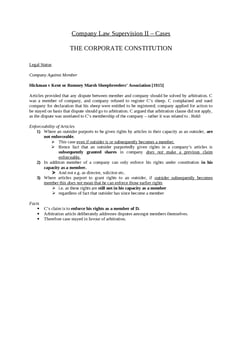Bushell v Faith [1970] 1 All ER 53
Judgement for the case Bushell v Faith
Table Of Contents
KEY POINTS
Removing a company director in a private firm is a critical part of corporate governance. It must follow legal guidelines and the company's rules, often detailed in its Articles of Association. To initiate the director’s removal, a crucial step is passing an "ordinary resolution" as defined by the Companies Act, 1948 (11 & 12 Geo. 6, c. 38), s. 184 (1).
In some private companies, a distinctive aspect is the allocation of multiple votes to the director's shares during the removal process, a provision often outlined in the Articles of Association. This measure safeguards the director's position, requiring substantial shareholder support for removal. Adhering to legal statutes, company-specific regulations, and understanding the voting rules in the Articles of Association are essential for a fair and transparent process that respects the director's rights and the company's best interests.
The legality of multiple votes for the director's shares underscores the importance of following company rules and applicable laws.
FACTS
Under the Companies Act 1948, the legal issue involves Article 9 of a private company's articles of association. Article 9 grants three votes per share a director holds in resolutions to remove directors.
The company had £300 in issued capital, distributed equally among the plaintiff, the defendant (her brother), and their sister, B. The plaintiff and defendant were the sole directors.
Dissatisfied with their brother's directorial performance, the sisters requisitioned a meeting to remove him. They voted in favor of the resolution, while the defendant opposed it. A dispute arose over the resolution's outcome: 200 votes for (sisters) vs. 300 votes against (defendant).
The plaintiff sought a declaration affirming the resolution's validity and an injunction to prevent the defendant from acting as a director.
JUDGEMENT
It was held that Article 9, despite the provisions of Section 184 (1) of the Companies Act, 1948, was valid and applicable. This ruling was based on the understanding that Parliament intended to establish an ordinary resolution sufficient for removing a director. Parliament had not intended to restrict a company's prerogative to issue shares with specific rights or restrictions as it deemed suitable.
These rights and restrictions did not need to apply universally but could be tailored to unique circumstances and specific types of resolutions.
The resolution to remove the director was deemed defeated, as the votes associated with Article 9 prevailed.
COMMENTARY
This case delves into a pivotal company law dispute under the Companies Act 1948. It revolves around Article 9 in a private company's articles, which grants a director three votes per share in removal resolutions.
In this context, the company had £300 in issued capital, equally divided among the plaintiff, her brother (the defendant), and their sister, B. Significantly, the plaintiff and defendant were the sole directors.
The conflict arose when the sisters, dissatisfied with their brother's performance as director, called for a removal meeting. The vote ended with 200 in favor (sisters) versus 300 against (defendant).
The case pivoted on interpreting Article 9 and Section 184(1) of the Companies Act 1948. While Section 184(1) aimed to streamline removal via an "ordinary resolution," it raised concerns about Article 9's validity, granting disproportionate voting power.
The court upheld Article 9's validity within the statutory framework. It underscored Parliament's intent to mandate an ordinary resolution for director removal without curtailing a company's freedom to structure shares with specific rights or restrictions adaptable to unique situations.
This ruling underscores company law's flexibility and the need for precise article drafting. The resolution to remove the director was ultimately defeated, with Article 9 votes prevailing. It underscores the balance between statutory rules and a company's contractual freedom in shaping its internal dynamics.
ORIGINAL ANALYSIS
Private company had 300 shares, divided equally between A, B and C. Company’s articles provided that where a vote was called on the removal of a director, that director’s shares would have three votes per share (as opposed to the usual one).
A and B proposed ordinary resolution to remove C, and claimed it passed 200 shares to 100; C claimed that by virtue of articles, his shares had three votes each when voting on resolution and therefore the resolution was defeated 300 votes to 200. Held:
Majority
Is nothing unobjectionable about special class rights attaching to shares only on specific occasions.
Thus it is possible for special class rights to make a director virtually irremovable.
IN any case, listed companies cannot circumvent s.168 through special rules such as these.
Thus ability to block removal of director via articles restricted to private companies
For Further Study on Bushell v Faith
Need instant answers? Our AI exam tutor is here to help.
Ask questions 🙋 Get answers 📔 It's simple 👁️👄👁️
Our AI is educated by the highest scoring students across all subjects and schools. Join hundreds of your peers today.
Get StartedSimilar Cases
Related Product Samples
These product samples contain the same concepts we cover in this case.
| Company Law | Corporate Governance Notes (18 pages) |
| Company Law | Division Of Power Notes (10 pages) |

